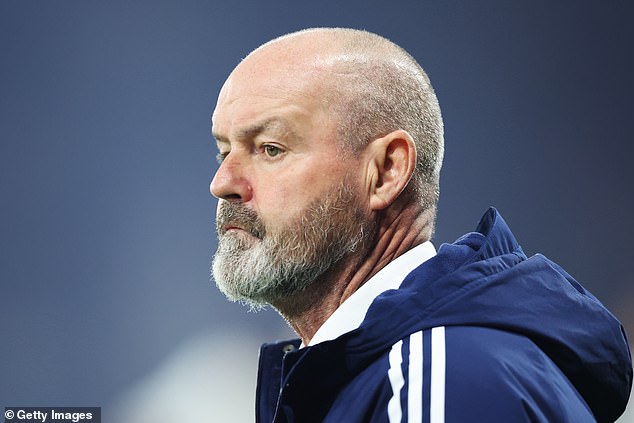When the dark of night falls on Athens, the Acropolis becomes ever more visible. Perched high above the city, it is a dazzling sight, glowing like a jewel in the crown of this fabled land.
It was once a citadel and place of worship dedicated to Athena, the patron after whom the city is named and the Goddess of wisdom, strategy and warfare in Greek mythology.
But even the tactical expertise of Athena would have nothing on Steve Clarke if he can execute his own masterplan and conquer this ancient battleground tonight.
In a country which saw empires rise and fall, and where Olympian Gods and Goddesses shaped the future of western civilisation, Clarke could become one of the all-time great deities in the pantheon of Scottish football.
Only two matches now stand between him and finally bringing to an end Scotland’s long and torturous wait to qualify for a World Cup Finals.
Scotland need to take a point against the Greeks at the Georgios Karaiskakis Stadium tonight, which would then tee up the prospect of a night for the ages at Hampden and a winner-takes-all clash against Denmark.

Steve Clarke’s legacy would be secure if Scotland can finish top of their qualifying group
If he can dig out a couple of results, Clarke’s ascension to the throne would be complete. For all his critics may argue that he has hung around too long, qualification for a World Cup would he a hell of a riposte.
His legacy would be secure. Leading Scotland to three major tournaments, one of which being a World Cup, would make it inarguable that he should be regarded as one of the country’s finest ever managers.
But all of this remains up in the air. There are still some fairly sizeable hurdles to be cleared, starting against a Greece side who will be thirsty for revenge and looking to sink Scotland in the Port of Piraeus tonight.
Like much of the architecture dotted around this city, Greece’s hopes of qualification are in ruins. Despite being fancied as potential group winners, they have already been knocked out.
A 3-1 defeat in Glasgow last month was a sickener given how Greece had comprehensively outplayed Scotland for the first hour of the match.
Just three days later, another 3-1 defeat to Denmark in Copenhagen proved fatal. The most technically gifted team in the section, Greece were out.
Their manager, Ivan Jovanovic, is now fighting for his future. Under mounting pressure from supporters, Jovanovic needs to prove he is the right man to lead this talented young team into the future.
It is for that reason alone that Scotland can expect a stiff test tonight. Despite already being out of the running, this is no dead-rubber for the Greeks. They have a point to prove.
The sprawling metropolis of Athens has witnessed a Scottish invasion over these past couple of days. The hustle and bustle of the streets has echoed to the Tartan Army’s songbook.
It started early. On the flight over on Thursday afternoon, the air hostess announced on the intercom that they had run out of beer before we had even flown over the White Cliffs of Dover.
Still with the guts of a four-hour flight ahead of them, Scotland fans soon found other refreshments to maintain their state of optimal hydration.
But it will be the quenching of their thirst to finally qualify for a World Cup that will ultimately define Clarke’s legacy as manager.

Midfielder John McGinn knows this might be his last chance to reach a World Cup finals
If Scotland were to falter, whether it be in these two games or the play-offs further down the line, it is inevitable that his tenure would feel unfulfilled.
Qualifying for back-to-back European Championships was one thing, but it’s a return to the grandest stage of all that fans crave above anything else.
At the outset of the campaign, Clarke spoke about the pressure of trying to reach a World Cup. It was real and unavoidable.
Some of the players are bound to feel it, as well. For the likes of captain Andy Robertson and talisman John McGinn, this could well be their last dance with regards to playing in a World Cup.
They are both 31 years old. There is no guarantee they will still be around in another four years’ time. Two stalwarts of the Clarke era, this could be as good a chance as they ever get.
Mind you, they are only pups in comparison to Craig Gordon. The veteran goalkeeper is 42, and will turn 43 at the turn of the year, yet Scotland might need one last hurrah from him.
Gordon has not played a minute of competitive football in six months. He lives only in the shadows at Hearts these days, but could find himself thrust into the limelight once again in Athens tonight.
With Angus Gunn out injured, Gordon offers experience that neither Liam Kelly nor Scott Bain can match. He has a highlights reel of world-class saves that ensure he will go down as one of Scotland’s all-time greats.
Yet, even so, it’s still a huge call facing Clarke. The twilight of Gordon’s career feels like it has lasted an eternity, to the point he has become Scotland’s very own Peter Pan.
But there is also an element of risk. Such a magnificent servant to Scotland over the best part of 20 years, it would be cruel if his final act was to be a mistake which blows a World Cup campaign.
Gordon doesn’t deserve that, but that’s the risk Clarke will need to weigh up with a goalkeeper who, for all his brilliance in years gone by, can’t be anything even close to match-sharp.
Despite the 4-2-3-1 system serving Scotland well so far, there’s a plausible argument that this match would warrant reverting to a back five.

Hearts keeper Craig Gordon could be thrust into Scotland’s starting line-up at the age of 42
With John Souttar, Grant Hanley and Scott McKenna as the three centre-backs, Scotland would be well-equipped to deal with the inevitable Greek pressure.
Andy Robertson and Aaron Hickey would operate as the wing-backs, with a central midfield diamond of Scott McTominay, Lewis Ferguson, McGinn and Ryan Christie playing behind Che Adams.
That would be how this particular observer would set the team up. For all Clarke and Scotland can talk about going for the win, the reality is that Greece are a cut above technically.
They will put Scotland under sustained pressure, as they have done in all three previous meetings between the teams this year. It would be wise for Clarke to tool-up accordingly.
Having spent the week training in Antalya in Turkey, Clarke and his players arrived in Athens knowing that history is within their grasp.
In this land of ancient mythology, Clarke often wears an expression that could turn Medusa to stone. Never was that more evident than when he had a very rare blast at his players post-Belarus last month.
Clarke branded it one of the poorest performances of his six-and-a-half year tenure after Scotland had laboured to a nervy and unconvincing 2-1 win over a team ranked 100 in the world.
Winning ugly on occasions is fine. But now comes the time when Scotland need to step it up. In Clarke’s Odyssey as Scotland manager, he and his players will aim to deliver a Spartan triumph.








